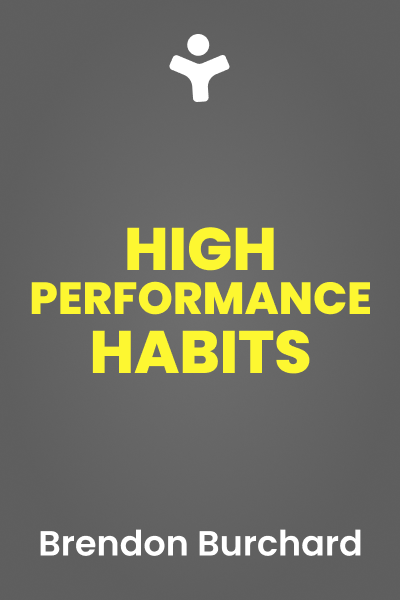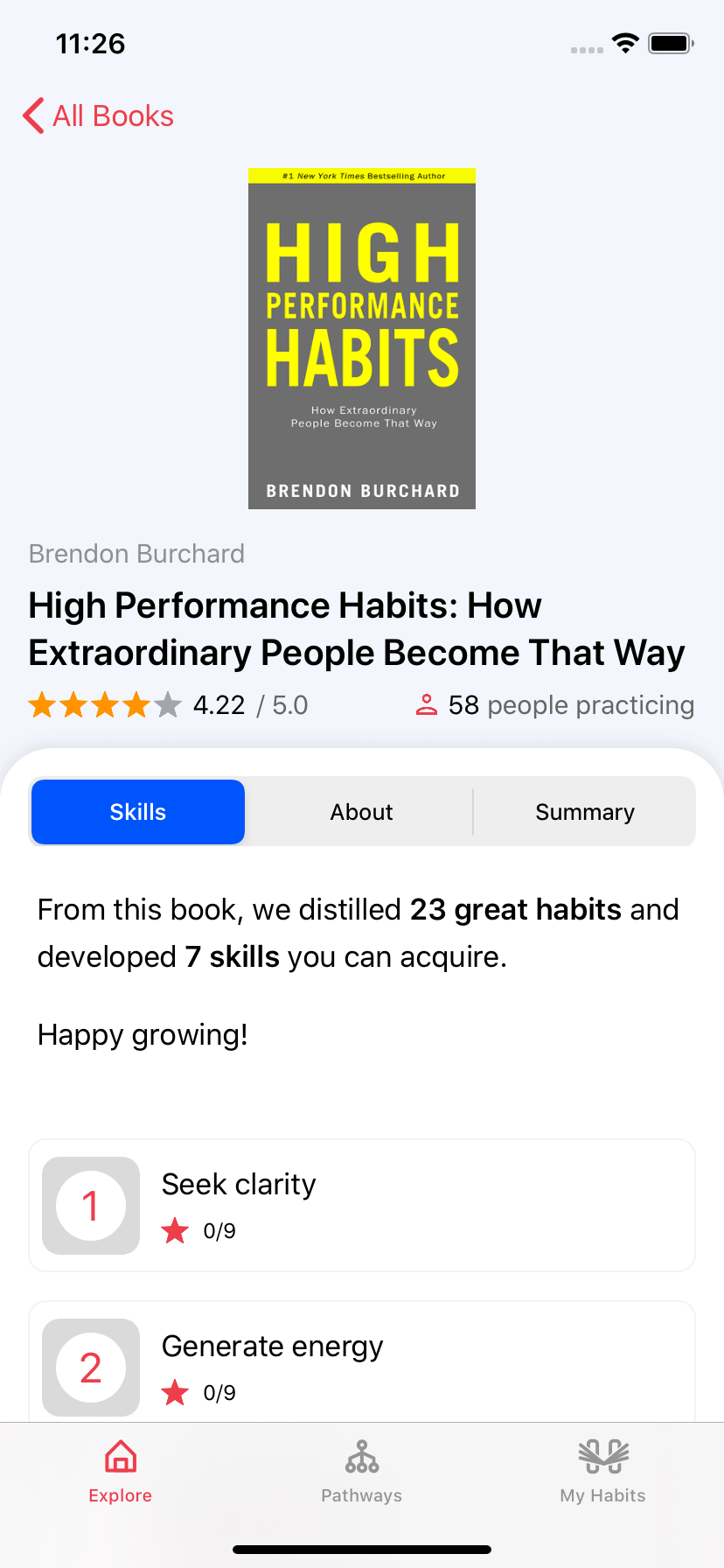
High Performance Habits: How Extraordinary People Become That Way
by Brendon BurchardHigh Performance Habits was created as a result of extensive scientific-based research of practices that inevitably lead to success. It describes three personal and three social habits that have more impact on productivity than innate strengths, skills, type of personality, IQ, or experience. And these habits apply to anyone, in any field, at any stage of life.
The book offers practical step-by-step instructions on how to form these habits and consistently reach high levels of performance over the long term. Mastering these practices will not only bring you closer to achieving your personal and professional goals, but will also drive you to greater happiness, better relationships, and improved overall health.
Seek clarity
“Clarity is a child of careful thought and mindful experimentation.”
Clarity means understanding who you are, what values you have, and your strengths and weaknesses. It is having a clear vision of the goals you are pursuing and knowing exactly why you want to achieve them.
Nobody has innate clarity, but it can be consciously generated. To gain greater clarity, you need to consistently ask questions, try new things, search through life’s opportunities, and ultimately figure out what is right for you.
As a result, people who are clear about their identity and intentions much more easily perform at a high level despite unpredictable circumstances, distractions, and mood swings. They are more likely to achieve challenging goals and have more fun and satisfaction in the process.
Actions to take
Generate energy
“If you ever want to get more done, you don’t need to buy some new app or organize your papers better. It’s less about doing email better and more about doing energy better.”
Energy is enduring mental, physical, and emotional vibrancy. Positive energy helps to better maintain focus, effort, and personal well-being.
Often people don’t care enough about what kind of energy they produce. They burn themselves out trying to succeed. Eventually, this neglect always backfires and significantly reduces performance. Having a low level of energy always means you don’t have the power to get involved in deep focused work and practice other high-performance habits.
Your energy level isn’t fixed, and it isn’t totally determined by personal characteristics. It can be improved with deliberate practices that are focused on developing mental stamina, physical energy, and positive emotions.
Actions to take
Raise necessity
“You cannot become extraordinary without a sense that it’s absolutely necessary to excel.”
Performance necessity is one of the most powerful drivers of human motivation and excellence. Raising the level of necessity makes you emotionally committed to the task at hand.
There are internal and external forces that create necessity and boost performance. These are:
-
Identity and personal standards of excellence: You should see yourself as a person who loves challenges and make actions and achievements part of who you are.
-
Obsession with understanding and mastering a topic: Curiosity makes the process enjoyable and builds deep competence.
-
Social duty, obligation, and purpose: It doesn’t give you a choice but to be good at what you do.
-
Real deadlines: Real negative outcomes if the due date isn’t met.
When it becomes too difficult to keep going to achieve your goal, these forces will pull you forward. To succeed, you should have a feeling that it is an absolute must to perform on a high level. Otherwise, there won’t be any consistent action.
Actions to take
Increase productivity
“No goals, no focus, no energy—and you’re dead in the water.”
To increase your level of productivity, you need to get better at goal setting and managing the amount of energy and focus you put into the task. Otherwise, information overload might lead to analysis paralysis—a situation when you are paralyzed by excessive amounts of data and spend too much time gathering and analyzing it.
To avoid getting stuck or torn apart in too many directions, it is vital to become crystal clear about what exactly will lead to success and direct most of your attention there. Multitasking will only make you feel overwhelmed and out of balance by doing work that you don’t find engaging or meaningful and that doesn’t bring significant results.
Actions to take
Develop influence
“The only way to influence another person is to first relate with them and to help raise their ambition to think better, do better and give more.”
Personal influence is the ability to shape other people's beliefs as desired. Having greater influence will make you more able to get people to believe in and support your efforts and ambitions.
Part of gaining influence is making lots of requests and getting better at doing so. Asking others for favors is a great way to develop your impact and make people like you. People support what they create.
It is crucial to demonstrate a sincere appreciation of those you want to influence. Be grateful and praise them publicly for success in achieving their goals. This will double the likelihood that they will help you in the future.
Actions to take
Demonstrate courage
“Only when our fears become our growth plan have we stepped onto the path of mastery.”
Courage means expressing your ideas freely, taking bold actions, and standing up for yourself and others, even in the face of fear, uncertainty, threat, or changing conditions.
Courage is not an occasional act, but a trait you cultivate through choice and willpower. You have to choose what your life is about: fear or freedom. To consistently demonstrate courage, you have to have faith in yourself and the future and change the way you view struggles.
Actions to take
Sustaining success
To stay on top of your field in the long term, it's not enough to regularly practice high-performance habits. When you constantly put yourself out there and reach one goal after another and become successful, it is common to eventually fail because you fall into the wrong patterns of thinking, feeling, and behaving—the anti-practices of high performance.
Actions to take
Don’t just read. Act.



